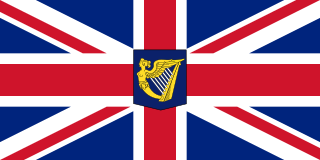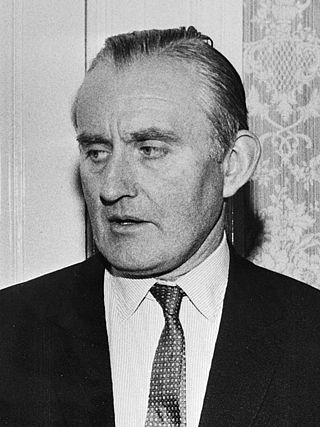
The Irish Free State, also known by its Irish name Saorstát Éireann, was a state established in December 1922 under the Anglo-Irish Treaty of December 1921. The treaty ended the three-year Irish War of Independence between the forces of the Irish Republic – the Irish Republican Army (IRA) – and British Crown forces.

The Ulster Unionist Party (UUP) is a unionist political party in Northern Ireland. The party was founded as the Ulster Unionist Council in 1905, emerging from the Irish Unionist Alliance in Ulster. Under Edward Carson, it led unionist opposition to the Irish Home Rule movement. Following the partition of Ireland, it was the governing party of Northern Ireland between 1921 and 1972. It was supported by most unionist voters throughout the conflict known as the Troubles, during which time it was often referred to as the Official Unionist Party (OUP).

The Government of Ireland Act 1920 was an Act of the Parliament of the United Kingdom. The Act's long title was "An Act to provide for the better government of Ireland"; it is also known as the Fourth Home Rule Bill or (inaccurately) as the Fourth Home Rule Act. The Act was intended to partition Ireland into two self-governing polities: the six north-eastern counties were to form "Northern Ireland", while the larger part of the country was to form "Southern Ireland". Both territories were to remain part of the United Kingdom of Great Britain and Ireland and provision was made for their future reunification through a Council of Ireland. The Act was passed by the British Parliament in November 1920, received royal assent in December and came into force on 3 May 1921.

Southern Ireland was the larger of the two parts of Ireland that were created when Ireland was partitioned by the Government of Ireland Act 1920. It comprised 26 of the 32 counties of Ireland or about five-sixths of the area of the island, whilst the remaining six counties, which occupied most of Ulster in the north of the island, formed Northern Ireland. Southern Ireland included County Donegal, despite it being the largest county in Ulster and the most northerly county in all of Ireland.

The Parliament of Northern Ireland was the home rule legislature of Northern Ireland, created under the Government of Ireland Act 1920, which sat from 7 June 1921 to 30 March 1972, when it was suspended because of its inability to restore order during The Troubles, resulting in the introduction of Direct Rule. It was abolished under the Northern Ireland Constitution Act 1973.

Northern Ireland is one of the four countries of the United Kingdom, situated in the north-east of the island of Ireland. It was created as a separate legal entity on 3 May 1921, under the Government of Ireland Act 1920. The new autonomous Northern Ireland was formed from six of the nine counties of Ulster: four counties with unionist majorities – Antrim, Armagh, Down, and Derry/Londonderry – and two counties with slight Irish nationalist majorities – Fermanagh and Tyrone – in the 1918 General Election. The remaining three Ulster counties with larger nationalist majorities were not included. In large part unionists, at least in the north-east, supported its creation while nationalists were opposed.

The House of Commons of Northern Ireland was the lower house of the Parliament of Northern Ireland created under the Government of Ireland Act 1920. The upper house in the bicameral parliament was called the Senate. It was abolished with the passing of the Northern Ireland Constitution Act 1973.

The Northern Ireland Office is a department of His Majesty's Government responsible for Northern Ireland affairs. The NIO is led by the Secretary of State for Northern Ireland and is based at Erskine House in Belfast City Centre and 1 Horse Guards Road in London.

The Government of Ireland Act 1914, also known as the Home Rule Act, and before enactment as the Third Home Rule Bill, was an Act passed by the Parliament of the United Kingdom intended to provide home rule for Ireland. It was the third such bill introduced by a Liberal government during a 28-year period in response to agitation for Irish Home Rule.

United Ireland, also referred to as Irish reunification, or a New Ireland, is the proposition that all of Ireland should be a single sovereign state. At present, the island is divided politically; the sovereign Republic of Ireland has jurisdiction over the majority of Ireland, while Northern Ireland, which lies entirely within the Irish province of Ulster, is part of the United Kingdom. Achieving a united Ireland is a central tenet of Irish nationalism and Republicanism, particularly of both mainstream and dissident republican political and paramilitary organisations. Unionists support Northern Ireland remaining part of the United Kingdom, and therefore oppose Irish unification.
There are a number of alternative names for Northern Ireland. Northern Ireland consists of six historic counties of Ireland, and remains part of the United Kingdom following the independence of the other twenty-six counties as the Irish Free State in 1922. In addition to, and sometimes instead of, its official name, several other names are used for the region. Significant differences in political views between unionists and Irish nationalists are reflected in the variations of names they use for the region. A proposal to change Northern Ireland's legal name to Ulster was seriously considered by the UK and Northern Ireland Governments in 1949 but in the end, the name "Northern Ireland" was retained.

The partition of Ireland was the process by which the Government of the United Kingdom of Great Britain and Ireland divided Ireland into two self-governing polities: Northern Ireland and Southern Ireland. It was enacted on 3 May 1921 under the Government of Ireland Act 1920. The Act intended both territories to remain within the United Kingdom and contained provisions for their eventual reunification. The smaller Northern Ireland was duly created with a devolved government and remained part of the UK. The larger Southern Ireland was not recognised by most of its citizens, who instead recognised the self-declared 32-county Irish Republic. On 6 December 1922, a year after the signing of the Anglo-Irish Treaty, the territory of Southern Ireland left the UK and became the Irish Free State, now the Republic of Ireland.

The Irish Free State Constitution Act 1922 was an Act of the Parliament of the United Kingdom, passed in 1922 to enact in UK law the Constitution of the Irish Free State, and to ratify the 1921 Anglo-Irish Treaty formally.
The law of Northern Ireland is the legal system of statute and common law operating in Northern Ireland since the partition of Ireland established Northern Ireland as a distinct jurisdiction in 1921. Prior to 1921, Northern Ireland was part of the same legal system as the rest of Ireland.

The Northern Ireland Constitution Act 1973 is an act of the Parliament of the United Kingdom which received the royal assent on 18 July 1973. The act abolished the suspended Parliament of Northern Ireland and the post of Governor and made provision for a devolved administration consisting of an Executive chosen by the new Northern Ireland Assembly devised under the Sunningdale Agreement; the assembly had already been created by the Northern Ireland Assembly Act 1973, passed two months earlier.
Robert Lynd Erskine Lowry, Baron Lowry, PC, PC (NI), was a Lord Chief Justice of Northern Ireland and a Lord of Appeal in Ordinary. Knighted in 1971, he was created a life peer as Baron Lowry, of Crossgar in the County of Down, on 18 July 1979, in the early months of the Thatcher government.
The Attorney General for Northern Ireland is the chief legal adviser to the Northern Ireland Executive for both civil and criminal matters that fall within the devolved powers of the Northern Ireland Assembly. The Attorney General for Northern Ireland is also responsible for appointing the director and deputy director of the Public Prosecution Service for Northern Ireland.

The Home Rule movement was a movement that campaigned for self-government for Ireland within the United Kingdom of Great Britain and Ireland. It was the dominant political movement of Irish nationalism from 1870 to the end of World War I.

R (Miller) v Secretary of State for Exiting the European Union is a United Kingdom constitutional law case decided by the United Kingdom Supreme Court on 24 January 2017, which ruled that the British Government might not initiate withdrawal from the European Union by formal notification to the Council of the European Union as prescribed by Article 50 of the Treaty on European Union without an Act of Parliament giving the government Parliament's permission to do so. Two days later, the government responded by bringing to Parliament the European Union Act 2017 for first reading in the House of Commons on 26 January 2017. The case is informally referred to as "the Miller case" or "Miller I".

The 1970 United Kingdom general election in Northern Ireland was held on 31 March with 12 MPs elected in single-seat constituencies using first-past-the-post as part of the wider general election in the United Kingdom. It was the first general election held after the Representation of the People Act 1969 which reduced the voting age from 21 to 18.













